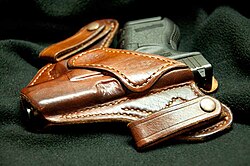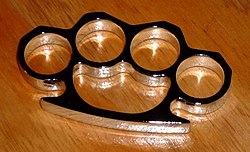Gun laws in Poland
Polish law allows modern firearms ownership on a general shall-issue basis under police-issued permit for people who provide an important reason.[6][7] The January 1919 decree stated that civilians needed government permit to purchase and own (long) firearms for hunting or handguns for self defense purposes.The above decree was superseded on 27 October 1932 by a more comprehensive executive order of the President of Republic of Poland,[10] which regulated trade, possession, import, export and transport of weapons, ammunition and explosives.However in the occupied Polish territory illegal possession of guns was treated unevenly; often the authorities tried to attribute a more serious crime, such as treason, armed counter-revolutionary activity etc., which were punishable by death or long labor camp sentences.However, the regulation mentioned only public administration employees as the prospective permit holders, requiring among other documentation a statement from the highest official in the voivodeship certifying that the applicant has a necessity to have a gun.The Militia could refrain from providing any justification of refusal or withdrawal of a permit, based on "security of the State or public order interest".In 1986 the administrative responsibility regarding firearms permits was moved to the local or voivodeship branches of the Security Service,[28] and in 1990 to the newly formed Police.Minister of Internal Affairs could enact temporary ban on firearms and order to place all private guns in Militia's deposit.[33] Illegal manufacturing, possession, sale or transfer of air guns, as well as other minor infractions such as carrying against the permit terms or other regulations, failure to inform of a change of the place of residence etc.Minister of Internal Affairs could enact a temporary ban on carrying loaded or unloaded guns or both, in the whole country or in designated areas.[34]: Art.More powerful air guns did not require a permit since then, but were made available only for people over 18 with no criminal record which had undergone medical and psychological evaluation, and had to be registered with the Police.4 Obligatory seizure of guns, ammunition and supporting documentation in case of accusation or suspicion of domestic violence has been introduced.[45]: Art.7 The obligation to re-take medical and psychological evaluations by holders of hunting permits, coming into effect this year, has been abolished, nullifying the 2018 amendment.[46]: Art.The owner who had the permit withdrawn is obliged to sell or otherwise dispose of guns within 30 days, or alternatively place them in the Police deposit for a fee.10 pkt 1 comes to the effect that permits are issued on an obligatory basis, however on the condition that the applicant "does not pose a threat to oneself or public order and safety, and provides an important reason for owning weapons".The entitled organizations include: The first two types of business units and schools providing instruction in private law enforcement may acquire full-auto weapons.Currently the only way to obtain working fully automatic firearm in Poland is via institutional or training permit (or by opening a gun dealership business).The somewhat vague definitions may create legal risks regarding import, sale and ownership of less conventional firearms, some accessories, historical artefacts (even if severely damaged, thoroughly rusty etc.Collectors can also store their guns in safe display cabinets equipped with shatterproof glass in a room with reinforced windows and doors, secured to prescribed levels and standards.The Police may pay a visit to check the safes and their certifications and verify the guns in possession (including serial numbers) against the permit, at any time.Firearms owned for self-defense and protection of persons and property purposes shall be carried concealed "as inconspicuously as possible, in a tight-fitting holster close to the body".Guns cannot be carried during public events and assemblies, in sea- and airports and on ships and airplanes (with exceptions) and in courts and state's attorney offices.It has become a common practice to issue ministerial regulations enforcing such limits during major events such as international conferences (NATO summit[62], UNESCO WHC session[63], OSCE PA session[64]), visits of prominent political figures (M. Pompeo[65], D. Trump[66], J. Biden[67], V. Zelenskyy[68]), mass public gatherings (rock festival[69][70], Pope Francis's visit[62]), or even on such occasions as National Independence Day.[73][74][v] Black powder firearms designed before 1885 not using pre-assembled ammunition or their modern functional replicas require no permit to own, and are therefore quite popular in the shooting community.Specific regulations are set in the Weapons and Munitions Act Chapter 4 (Articles 45 to 49): Environmental rules for outdoor ranges are rather simple:[37] water table shall be at least 1 m below surface; a range using firearms shall not be localized in zones dedicated for residential, health care, or recreational purposes, or near kids and youth facilities; berms shall be cleaned of lead-containing ammo once in 3, 5, or 7 years (depending on water table level) and kept at pH of 6.5 to 8.5.The limitations of self-defense permits manifest in restriction of kinds of weapons that can be purchased on such permit to handguns (including gas guns and blank-firing guns), electroshock devices and incapacitating gas dispensers, the obligation to retake medical and psychological evaluations every five years and, most importantly, the need to show the important reason for possession of firearms of a "constant, real and higher than average" threat to one's life, health or property.The Article 25 section 1 says that "does not commit a crime who acts in necessary defense by repelling a direct and unlawful attack on any right protected by law".The Penal Code does not elaborate on what the limits of defense are, therefore the interpretation of excessive use of force is left to the justice system, both the public prosecution and the courts, with widely disparate results.[92] However, an amendment enacted in 2023 allowed persons who serve in the military or law enforcement agencies to obtain this kind of permits after declaring "willingness to strengthen the defense potential of the Republic of Poland".Intentionally abandoning or discarding firearms or ammunition is a felony punishable by fine (theoretically, according to the Penal Code, up to one million złoty), community service or prison time of up to two years.[49]: Art.





Polish lawred flag lawsPoland166th most armed countryJózef PiłsudskiPartitions of PolandAustrianPatentPolish markaPresidentRepublic of PolandcountyvagabondsNazi-Soviet occupationSoviet UnionRussian SFSRByelorussian SSRUkrainian SSRconstituent republicsPolish People's Republicruling partyWorld War IIStanisław RadkiewiczMinistry of Public SecurityvoivodeshipCitizens' MilitiaSecurity ServicePolicegas gunsflare gunselectroshock weaponscrossbowsnunchakusbrass knucklesMartial law in PolandjoulesTerritorial Defense ForceMilitary Policeadministrative lawadministrative courtsPolish Sport Shooting Federationsubmachine gunsred deerfallow deermouflonwild boarbadgermartenpolecatracoon dograccoonAmerican minkpublic lawSupreme Administrative Courtprivate security servicesEuropean Firearms PassKbkg wz. 1960European Standardfire extinguisherfire blanketNATO summitOSCE PA sessionM. PompeoD. TrumpJ. BidenV. Zelenskyyrock festivalPope FrancisNational Independence Day2021–2022 Belarus–European Union border crisisCzechiaincapacitating gas dispenserswater tablehandgunscriminal lawPolish Penal Codejustificationcastle doctrinepre-trial detentionprivate limited companiesPolish złotySmall Arms SurveyOverview of gun laws by nationstarting pistolsprop gunsPolish Postlex specialiscrisis on the Belarusian borderthe PresidentChief of State (Poland)Emperor of AustriaPresident of PolandPolicjaGun laws by countrySouth AfricaArgentinaBrazilCanadaGuatemalaHondurasJamaicaMexicoUnited StatesUruguayVenezuelaAzerbaijanIsraelKazakhstanKuwaitLebanonPakistanPhilippinesAustriaCurrent lawHistoryFinlandFranceGermanyIrelandLithuaniaNorth MacedoniaNorwayRussiaSwitzerlandTurkeyUkraine